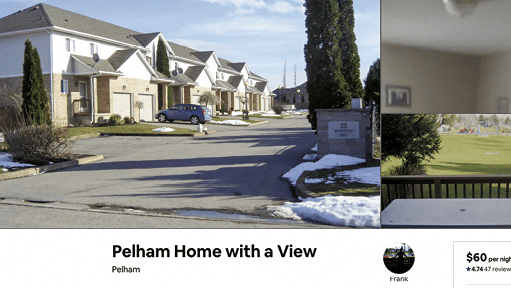Pelham hosts long-delayed public meeting on divisive issue
BY JOHN CHICK Special to the VOICE
Pelham Town Council hosted its long-awaited special public meeting on short-term rentals Oct. 22, with staff presenting its official draft plan amendment proposal to deal with yet another global economic and cultural disruption.
Director of Planning and Development Barb Wiens led off the meeting highlighting the draft plan, which included:
-Permitting short-term accommodations in the downtown, “downtown transitional area,” and “good general agricultural” with “specialty agricultural and environmental protection subject to specific policy requirements.”
-Permitting bed and breakfast establishments in residential designations.
The zoning bylaw amendment would seek to:
-Permit a bed and breakfast establishment in a residential zone subject to meeting parking, signage, Ontario building code, fire code, and licensing requirements and being occupied as a principal residence by the owner/operator.
-Permit short-term accommodations in agricultural, special rural, neighbourhood commercial, general commercial and commercial rural zones.
Not surprisingly, most of the public feedback by those in the audience was anti-rental.
Haist Street resident Esther Hougham slammed some of the proposed loopholes, wanting all short-term rentals, be they contemporary Airbnbs or traditional bed and breakfasts, banned outright from residential areas.
“No bed and breakfasts,” she said. “It’s not that our eyes are closed to progress and growth … but we don’t want to have strangers coming in and out next door.”
Hougham then asked Wiens where she lived.
“Pardon me?” the director replied before Mayor Marvin Junkin interjected and said Wiens didn’t have to answer. “That’s not a good question,” he said.
“It’s not a good question, but it is an important point to the people who do live here,” Hougham responded.
Ward 2 Councillor Ron Kore asked Wiens about how short-term rentals would be zoned, erroneously referring to Pelham as a “single-dwelling community.”
“We don’t define a ‘single-detached’ community,” Wiens replied, explaining that there are currently three residential zonings in the Town.
“I wouldn’t want [short-term rentals] beside me or my house,” Kore said, to boisterous applause from the public gallery.
Another woman, Pat, told council that she prefers “peace, quiet and familiar faces.”
Staff reported that approximately 20 short-term rental properties are operating in Pelham today, with about half being the traditional bed-and-breakfast types.
Cory Ziraldo of the Lookout Residents Group said his concern is unlicensed Airbnbs —which he said are prevalent in his neighbourhood because of the newer construction of the homes.
“We still have to deal with the ones who don’t get a licence,” he said, differentiating them from bed-and -breakfasts, which are traditionally small businesses.
“If council were to pass a licencing bylaw, then all businesses would be required to have a licence,” said Wiens. “Whether they are new or existing they would require a licence and the fees would be to cover administrative costs, they would not be a punitive amount.”
That brought up the topic of enforcement once the new rules are in place.
“It’s one thing to pass a bylaw, it’s another to enforce it,” Junkin said, adding that the next budget has requested the hiring of an additional bylaw enforcement officer.
“I’m not going to promise you that everything is going to be sunshine and roses here,” Wiens replied to the Mayor. “But … when these operators realize you are out there doing enforcement regularly and consistently, you start not to have the problems.”
Town CAO David Cribbs said that enforcement is essentially a moot point, because it’s going to be needed whichever way is decided on.
“When we do come to a decision, the enforcement issue is the same whether you ban them or allow them everywhere,” Cribbs said. “There’s no outcome here that doesn't require more enforcement … there’s a shameless plug [for a new bylaw officer].”
The only member of the public to speak in favour of short-term rentals was Lindy, a younger woman who said she runs an operation in an agricultural zone of Pelham and has welcomed visitors from as far away as Australia. Her main concern was whether new regulations would protect operations like hers through grandfathering.
“Is there going to be some grandfathering for these people who haven’t had a problem?” she asked. “Pelham is growing, the population is going to rise. The downtown is not what it used to be. I think it’s a good source of income for certain folks. I just think we’ve put such a hex on these [short-term rentals]. I want to speak for the people who have been doing it well.”
She also hoped that licensing fees would be reasonable.
“Pelham is not the tourist destination that Niagara-on-the-Lake is,” she said. “We shouldn’t have the same fees.”
A man named Chuck Miller, who identified himself as a former municipal planner, echoed her concerns about grandfathering, although in Miller’s case it appeared to be because he has a neighbour on Baker Place in Fonthill renting out their house as an Airbnb.
Wiens responded that it seems grandfathering would be allowed.
“We have had discussions with legal counsel,” she said. “The indication is that … existing ones are grandfathered under zoning, not licensing.”
Kore also asked Wiens about taxation on the properties.
“Typically in other municipalities, their impact does imply a surcharge to the residential dwelling to adjust for the fact it is an income-generating property,” she said.
Public input will be gathered until November 30. Residents are encouraged to submit their opinions to: [email protected]



